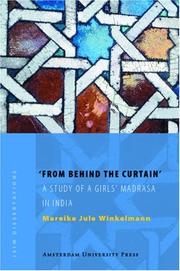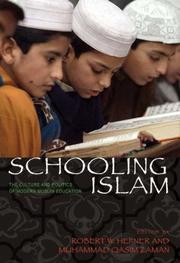| Listing 1 - 6 of 6 |
Sort by
|
Book
ISBN: 2909194051 2909194531 2821862180 Year: 2015 Publisher: Sanaa : Centre français de recherche de la péninsule Arabique,
Abstract | Keywords | Export | Availability | Bookmark
 Loading...
Loading...Choose an application
- Reference Manager
- EndNote
- RefWorks (Direct export to RefWorks)
Tout au long de la longue histoire du Yémen islamique, les savants ont trouvé en certaines localités, parfois désignées sous le nom de Hiğra, un lieu privilégié pour la transmission de leurs savoirs. Le présent texte, traduit de l'arabe, constitue l'introduction générale à la vaste encyclopédie en cinq volumes que le cadi Ismā‘īl b. ‘Alī al-Akwa‘ leur a consacrés. During the long history of Islamic Yemen, scholars have found in certain places, sometimes called Hiğra, a favorable environment for teaching and learning. This book, translated from arabic, is the general introduction to the five-volumes encyclopaedia that has been devoted to theses "refuges of learning" by the late Yemeni scholar Cadi Ismā‘īl b. ‘Alī al-Akwa‘.
Book
ISBN: 235159472X Year: 1932 Publisher: Presses de l’Ifpo
Abstract | Keywords | Export | Availability | Bookmark
 Loading...
Loading...Choose an application
- Reference Manager
- EndNote
- RefWorks (Direct export to RefWorks)
Completed in 1932, this work by Jean Sauvaget provides an inventory of Damascene heritage. While little remains of the ancient city (Bâb Charqi, Bâb Saghîr, temple of Jupiter, Roman aqueduct and chapel of Saint Ananias), the remains of the Muslim and medieval period are much more numerous (more than one hundred elements listed for about forty illustrations).A very long chapter is devoted to the Umayyad Mosque. But the architectural riches do not stop there, since it is also worth mentioning the citadel, the gates, the mausoleums, the madrasas, the caravanserais and other hammams, which help to make the Syrian capital an exceptional city.
Art, Architecture & Applied Arts --- Architecture --- Syrie --- Empire byzantin --- mausolée --- Damas --- mosquée --- madrasa --- monuments historiques
Book
ISBN: 235159455X Year: 1950 Publisher: Presses de l’Ifpo
Abstract | Keywords | Export | Availability | Bookmark
 Loading...
Loading...Choose an application
- Reference Manager
- EndNote
- RefWorks (Direct export to RefWorks)
Written by J. Sauvaget and M. Écochard, the descriptions and illustrations contained in this book are intended to be representative of the art of Damascus in the Ayyubid period in the broad sense.There are a series of tombs (Ṣafwat al-Molk, Farroukh-Châh, Bahrâm-Châh, Miṯqâl), madrasas (Djahârkasiya, Raiḥâniya, ‛Aḏrawiya,‛ Izziya hors-les-murs, ‛Âdiliya, Mâridâni hors-les-murs,‛ Âdiliya- the-walls), cenotaphs (Fâṭima, Abân, Badr, the emir Altountâch, Sokaina, Bilâl), as well as several epitaphs, the three Ayyubid baths of Damascus and dar al-Ḥadith of Nour ad-Din.The editor has also found it useful to include a bibliography of epigraphic and archaeological publications that have addressed the issue.
Art, Architecture & Applied Arts --- Architecture --- Damascus (Syria) --- Antiquities. --- Dimashq (Syria) --- Dameśeḳ (Syria) --- Damascus --- Damas (Syria) --- Şam (Syria) --- architecture traditionnelle --- Ayyoubide (dynastie) --- Syrie médiévale --- monuments --- Damas --- madrasa

ISBN: 9053569073 9786611979089 1281979082 9048504414 9789048504411 9789053569078 Year: 2005 Publisher: Amsterdam Amsterdam University Press
Abstract | Keywords | Export | Availability | Bookmark
 Loading...
Loading...Choose an application
- Reference Manager
- EndNote
- RefWorks (Direct export to RefWorks)
This study investigates how madrasas for girls emerged in India, how they differ from madrasas for boys, and how female students come to interpret Islam through the teachings they receive in these schools.
Islam --- Developmental psychology --- Educational systems. Teaching systems --- Didactics --- India --- Madrasahs --- Women --- Islamic education --- History. --- Education --- Education, Islamic --- Education, Muslim --- Muslim education --- Human females --- Wimmin --- Woman --- Womon --- Womyn --- Females --- Human beings --- Femininity --- Madrasas --- Madrassahs --- Madrassas --- Medreses --- Schools --- Muslims --- Madrasehs --- Medressehs --- Islamic religious education --- fundamentalism --- women --- religie --- religious education --- anthropologie --- india, delhi --- women's education --- gender --- islamism --- religion --- education --- piety movements --- anthropology --- madrasa --- tabligh jamaat --- Single-sex education --- Girls --- Curriculum --- Book

ISBN: 1400837456 9786612964664 1282964666 9781400837458 9780691129327 0691129320 9780691129334 0691129339 6612964669 9781282964662 Year: 2007 Publisher: Princeton: Princeton university press,
Abstract | Keywords | Export | Availability | Bookmark
 Loading...
Loading...Choose an application
- Reference Manager
- EndNote
- RefWorks (Direct export to RefWorks)
Since the Taliban seized Kabul in 1996, the public has grappled with the relationship between Islamic education and radical Islam. Media reports tend to paint madrasas--religious schools dedicated to Islamic learning--as medieval institutions opposed to all that is Western and as breeding grounds for terrorists. Others have claimed that without reforms, Islam and the West are doomed to a clash of civilizations. Robert Hefner and Muhammad Qasim Zaman bring together eleven internationally renowned scholars to examine the varieties of modern Muslim education and their implications for national and global politics. The contributors provide new insights into Muslim culture and politics in countries as different as Morocco, Egypt, Pakistan, India, Indonesia, Iran, and Saudi Arabia. They demonstrate that Islamic education is neither timelessly traditional nor medieval, but rather complex, evolving, and diverse in its institutions and practices. They reveal that a struggle for hearts and minds in Muslim lands started long before the Western media discovered madrasas, and that Islamic schools remain on its front line. Schooling Islam is the most comprehensive work available in any language on madrasas and Islamic education.
Comparative education. --- Religion and culture. --- Religion and politics. --- Islam and politics. --- Madrasahs. --- Islamic religious education. --- Education, Comparative --- Education --- Culture and religion --- Culture --- Political science --- Politics, Practical --- Politics and religion --- Religion --- Religions --- Islam --- Politics and Islam --- Madrasas --- Madrasehs --- Madrassahs --- Madrassas --- Medreses --- Medressehs --- Islamic religious education --- Schools --- Muslims --- Muslim religious education --- Religious education, Islamic --- Islamic education --- Religious education --- History --- Religious aspects --- Political aspects --- Education religieuse islamique --- Madrasa --- Islam et politique --- Religion et politique --- Religion et culture --- Education comparée --- Madrasahs --- Islam and politics --- Religion and politics --- Religion and culture --- Comparative education
Book
ISBN: 9087280254 9786611991401 1281991406 9048510058 9789087280253 9789048510054 9848510058 9781281991409 Year: 2008 Publisher: [Leiden]: Leiden University Press,
Abstract | Keywords | Export | Availability | Bookmark
 Loading...
Loading...Choose an application
- Reference Manager
- EndNote
- RefWorks (Direct export to RefWorks)
Religious scholarship can be offensive to believers, as conflicts from the time of Galileo and Spinoza to the recent critique of Danish religious scholars in the wake of the infamous Muhammad cartoons have shown. Studies of this type of scholarship have been appropriated by believers as a means of reinventing their own identities - as the training of twentieth-century Muslim clergy demonstrates. This volume offers a unique collection of training materials from European Muslim clergy since the 1940's - including Third Reich reports on debriefing imams, surveillance files on Muslim activists, and information on Bosnian clergy and their training centres - as well as an exploration of religion and academic freedom in general, accompanied by appendices in both Arabic and English.
Functionaries --- 297.16 --- 297 (492) --- 378.014.15 --- Islam: religieuze organisatie religieuze functies en personen --- Islam. Mohammedanisme--Nederland --- Academisch statuut. Academische vrijheid. Universiteitsreglementen --- 378.014.15 Academisch statuut. Academische vrijheid. Universiteitsreglementen --- 297.16 Islam: religieuze organisatie religieuze functies en personen --- Academic freedom. --- Educational freedom --- Freedom, Academic --- 081 Godsdienst --- Islam --- 297.16 Islam: religieuze organisatie; religieuze functies en personen --- Islam: religieuze organisatie; religieuze functies en personen --- Religion --- Freedom of religion. --- Religious education. --- Imams (Mosque officers) --- Mosque officers --- Mohammedanism --- Muhammadanism --- Muslimism --- Mussulmanism --- Religions --- Muslims --- Ethical education --- Theological education --- Education --- Moral education --- Freedom of religion --- Freedom of worship --- Intolerance --- Liberty of religion --- Religious freedom --- Religious liberty --- Separation of church and state --- Freedom of expression --- Liberty --- Freedom of information --- Intellectual freedom --- Study and teaching. --- Training --- Law and legislation --- Academic freedom --- Religious education --- Study and teaching --- Religion, Primitive --- Atheism --- God --- Irreligion --- Theology --- Islam - Study and teaching - Europe --- Islam - Functionaries - Training - Europe --- islam --- imam --- religie --- training --- religion --- muslim clergy --- Ibn Rushd --- Galileo --- Spinoza --- Abu Zayd --- Egypt --- political cartoons --- 9-11 --- academic freedom --- religious freedom --- the training of Muslim clergy --- Bosnia --- the Ghazi Husrev-bey madrasa --- Sarajevo --- 1537 --- nazi-Germany --- Europe
| Listing 1 - 6 of 6 |
Sort by
|

 Search
Search Feedback
Feedback About UniCat
About UniCat  Help
Help News
News